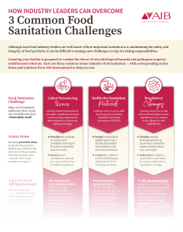The Importance of Food Safety Training for Economic Growth
In Maslow’s Hierarchy of Needs, access to food, water, and shelter are requirements for basic living. Societies have a similar hierarchy of needs to develop economically, beginning with the foundational importance of food safety.
In order to grow and develop, populations need consistent access to not only nutritional food, but food that won’t expose them to pathogens and cause illnesses. However, creating a safe food supply takes more than scientific understanding: it requires a comprehensive, food safety regulatory landscape, and ongoing food safety training to uphold standards and reinforce adherence.
The Economic Importance of Food Safety
In the days of small agricultural communities and subsistence farming, foodborne illnesses could only impact the small number of people exposed to contaminated food. However, in industrialized society with entire populations fed by the same food system, contamination impacts the collective — requiring a higher level of food safety standards.
In developed nations, consumers worry about the nutritional value of their food — but may take food safety for granted. In still-developing regions, foodborne illnesses are an ever-present danger. In fact, the World Health Organization estimates that 600 million people across the globe each year contract illnesses from their food, resulting in 420,000 deaths.
Training stakeholders to maintain these standards can bolster economic growth with:
1. Increased Financial Security for Citizens
When people are sick, they can’t work, resulting in lost wages, and sometimes lost employment. A bacterial infection can impact individual and family finances for years. Or a parents’ lost wages may limit educational prospects for their children, creating a multi-generational cycle of poverty. When the food supply is safe, people are less likely to get ill and fall behind on work and schooling, allowing them to build savings and accrue more wealth.
2. Higher Productivity
The less often people are ill, the more productive they can be. Day-to-day individual output increases dramatically when they don’t have to worry about the integrity of the food and water that fuels them. In turn, businesses and civic organizations benefit from a more reliable labor force, enabling the development of advanced infrastructure, more economic activity, and greater prosperity. More economic opportunity in a region also enhances financial security for the people who live there.
3. Reduced Burden on Healthcare Systems
High rates of foodborne illnesses can overwhelm local hospitals and clinics, straining staff, pharmaceutical supplies, and other health resources. On the other hand, improving the safety of the food supply means medical providers spend less time and energy managing emergencies, dramatically reducing healthcare spending. In nations with socialized medicine, less strain on the healthcare system frees the government to invest more in infrastructure and other projects that benefit the public good. Individuals benefit financially as well, with fewer economic setbacks from hospital bills.
4. Enablement of Trade
The global marketplace requires exporters to comply with stringent regulations to keep people and the supply chain safe. Regions that haven’t adopted modern food safety training often can’t participate in international trade because their exports don’t meet global standards. Economies that can quickly grow their gross domestic product (GDP) through trade are also able to attract foreign investment and business interest, enabling even more rapid economic growth. Increased commercial activity from trade invites additional benefits as well, like more tourism.
Building the Economy With Food Safety Training
Creating a safe food supply and reducing risk of foodborne illness lays the foundation for a civilization to grow. Just as food security helps individuals gather resources, form communities, and develop self-esteem, a safe food supply helps societies become more stable, generate more economic activity, and develop an identity in the global community. It all begins with adopting global compliance standards, and providing food safety training for frontline food workers.
AIB International is a world leader in food safety consulting and education, with a number of programs designed to help businesses comply with global standards. Get started with the fundamentals of Good Manufacturing Practices & Sanitation Food Safety Training.



